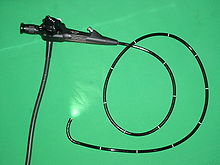Basil Hirschowitz
Basil Isaac Hirschowitz (29 May 1925 – 19 January 2013) was an academic gastroenterologist from the University of Alabama at Birmingham (UAB) best known in the field for having invented an improved optical fiber which allowed the creation of a useful flexible endoscope. This invention revolutionized the practice of gastroenterology and also was a key invention in optical fiber communication in multiple industries.[1]
Hirschowitz was born in Bethal, South Africa. He received his medical education at University of the Witwatersrand in Johannesburg. It was from this institution that he earned M.B. and B.Ch. degrees in 1947. He received Postdoctoral training from University of the Witwatersrand, earning an M.D. degree.
In 1953 he moved to the United States, where he continued his gastrointestinal fellowship at the University of Michigan and joined the faculty between 1954 and 1957. Hirschowitz became a naturalized citizen of the USA in 1961.[2]

Among his many awards, Basil Hirschowitz received the Schindler Medal of the ASGE, the Friedenwald Medal of the AGA (1992),[3] the General Motors Cancer Research Awards Kettering Prize (1987),[4] the UAB Distinguished Faculty Lecturer, and Honorary Fellow of the Royal Science of Medicine. The Alabama Healthcare Hall of Fame honors Dr. Basil Hirschowitz for reaching the pinnacle of academic medicine as a teacher, scientist, and clinician. In 2006 he became M.D.h.c (Honorary Doctor of Medicine) at the University of Gothenburg, Sweden.
Groll-Hirschowitz syndrome — a rare genetic condition characterized by gastrointestinal abnormalities, deafness and neuropathy.[5] It is named in honour of B. Hirschowitz and A. Groll, who first described the condition.[6]
Hirschowitz died in Birmingham, Alabama on 19 January 2013.[7]
References
- ^ Black, Hank. "The Enlightening Endoscope: A Tool That Transformed GI Care." Archived 13 October 2007 at the Wayback Machine - UAB Magazine, Fall 1997, Volume 17, Number 4.
- ^ The following biographical sketch was compiled at the time of induction into the Alabama Academy in 1991. Basil Isaac Hirschowitz
- ^ American Gastroenterological Association. Julius Friedenwald Medal[permanent dead link].
- ^ Laureates General Motors Cancer Research Awards
- ^ "Groll-Hirschowitz syndrome Symptoms, Diagnosis, Treatments and Causes - RightDiagnosis.com". www.wrongdiagnosis.com. Retrieved 21 November 2017.
- ^ Hirschowitz BI, Groll A, Ceballos R. Hereditary nerve deafness in 3 sisters with absent gastric motility, small bowel diverticulitis and ulceration and progressive sensory neuropathy. Birth Defects Orig Art Ser. 1972; 8: 27–41.
- ^ "In Memory of Dr. Basil Isaac Hirschowitz". Dignity Memorial. Retrieved 21 January 2013.
External links
- Optical Fiber contains more information about Basil Hirschowitz in History section.
- Use dmy dates from July 2012
- 1925 births
- 2013 deaths
- People from Bethal
- American gastroenterologists
- American inventors
- University of Alabama at Birmingham faculty
- University of Michigan fellows
- University of the Witwatersrand alumni
- University of Michigan alumni
- South African gastroenterologists
- American medical biography stubs
- American academic biography stubs
